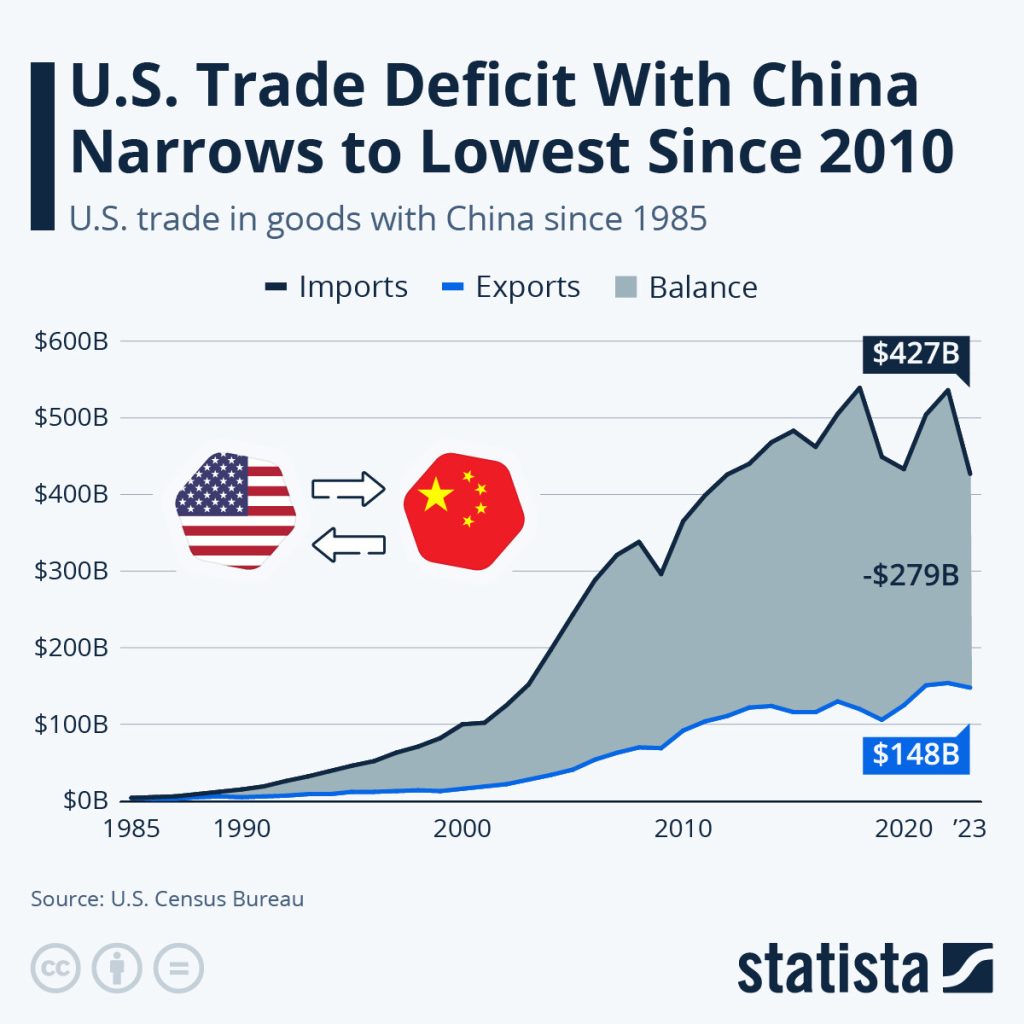Increased Canadian Oil Exports To China: Implications Of US-China Trade Conflict

Table of Contents
Booming Demand in China and Canadian Opportunities
China's burgeoning economy fuels a massive and ever-increasing energy demand. This presents a significant opportunity for Canada, a nation with substantial oil reserves, to diversify its energy markets and lessen its dependence on the United States. Canadian oil, particularly Western Canadian Select (WCS), offers a potential alternative to Middle Eastern and US supplies for China.
- Chinese energy demand: China's rapid industrialization and growing population require a stable and diverse energy supply. This demand is projected to continue rising for decades, creating a lucrative market for Canadian oil producers.
- Canadian oil supply: Canada possesses abundant oil reserves, particularly in Alberta and Saskatchewan. These reserves represent a significant potential source to meet China's growing energy needs.
- Diversification of markets: Increased exports to China allow Canada to diversify its energy markets, reducing its vulnerability to fluctuations in the US market and bolstering its energy security.
- Oil pipeline capacity: The expansion of pipeline infrastructure, such as the Trans Mountain pipeline expansion project, is crucial for facilitating the increased flow of Canadian oil to the Pacific coast for export to Asia, including China. This infrastructure is essential to realizing the full potential of increased Canadian oil exports to China.
- Suitability of Canadian oil: The characteristics of different types of Canadian crude oil, like WCS, and their suitability for Chinese refineries are key factors influencing trade volumes. Understanding these specifics is vital for successful market penetration.
Geopolitical Implications and US-Canada Relations
Increased Canadian oil exports to China introduce a layer of geopolitical complexity, potentially impacting North American energy relations and the delicate balance between Canada and the US.
- North American energy relations: The US may view increased Canadian oil exports to China as a threat to its energy interests and strategic goals, potentially leading to diplomatic friction. This requires careful management of the relationship between the two North American allies.
- US-Canada trade: Any perceived undermining of US energy interests could influence bilateral trade negotiations and broader diplomatic ties between Canada and the United States.
- Diplomatic tensions: Balancing the desire to expand trade with China while maintaining strong relationships with the US requires skillful diplomacy and a nuanced understanding of each nation’s priorities.
- Potential for sanctions: The US could potentially impose sanctions or trade restrictions on Canadian energy exports to China if it perceives a strategic threat. Canada must navigate these potential risks carefully.
- Balanced diplomatic strategies: Canada needs to develop and implement balanced diplomatic strategies that maintain positive relationships with both the US and China, ensuring that energy exports contribute to, not detract from, broader diplomatic goals.
Economic Benefits and Challenges for Canada
Increased Canadian oil exports to China offer significant potential economic benefits, but also present considerable challenges.
- Canadian economic growth: Increased oil exports to China can stimulate economic growth in Canada, creating jobs in the energy sector and related industries, as well as boosting government revenues.
- Job creation: The energy sector and associated industries, including transportation and logistics, will benefit from increased activity, leading to job creation across various Canadian provinces.
- Energy sector investment: Increased demand for Canadian oil can attract significant foreign and domestic investment in the Canadian energy sector, further stimulating economic growth.
- Market volatility: Dependence on a single major buyer, like China, exposes Canada to the risks of market volatility and price fluctuations, impacting the stability of the Canadian economy.
- Trade agreements: The existence and effectiveness of trade agreements between Canada and China play a pivotal role in securing and facilitating these increased exports.
- Environmental concerns: Increased oil production and transportation raise significant environmental concerns, including greenhouse gas emissions and potential for environmental damage.
Environmental Considerations and Sustainable Practices
The environmental impact of increased Canadian oil production and transport must be carefully considered and addressed.
- Environmental impact assessment: Thorough environmental impact assessments are crucial to minimize the ecological footprint of increased oil production and transportation.
- Sustainable energy: Canada's commitment to reducing carbon emissions and transitioning towards a more sustainable energy future needs to be integrated into its oil export strategy.
- ESG investing: The growing importance of ESG (environmental, social, and governance) investing will influence how the Canadian oil sector operates and attracts investment.
- Clean energy transition: Investment in clean energy technologies and initiatives to reduce the carbon intensity of oil production is vital for long-term sustainability.
Conclusion
Increased Canadian oil exports to China present both significant opportunities and considerable challenges for Canada. While it offers a chance to diversify markets, boost the economy, and reduce reliance on the US, it also introduces geopolitical risks and necessitates careful consideration of environmental implications. Navigating this complex landscape requires strategic diplomacy, sustainable practices, and a robust understanding of the evolving global energy landscape. The future success of increased Canadian oil exports to China hinges on carefully balancing economic gains with geopolitical realities and environmental responsibility.
Call to Action: To stay informed about the evolving dynamics of Canadian oil exports to China and the implications of the US-China trade conflict, continue following industry news and engaging in informed discussions. Understanding the intricacies of Canadian oil exports is crucial to participating effectively in this dynamic and consequential market.

Featured Posts
-
 Michael Lorenzen Stats Highlights And Career Analysis
Apr 23, 2025
Michael Lorenzen Stats Highlights And Career Analysis
Apr 23, 2025 -
 Athletics Edge Out Brewers In 3 1 Victory
Apr 23, 2025
Athletics Edge Out Brewers In 3 1 Victory
Apr 23, 2025 -
 Mlb Umpiring Controversy Tigers Manager Demands Replay Evidence After Questionable Call
Apr 23, 2025
Mlb Umpiring Controversy Tigers Manager Demands Replay Evidence After Questionable Call
Apr 23, 2025 -
 Record Breaking Game Yankees Hit 9 Homers Judges Power Show
Apr 23, 2025
Record Breaking Game Yankees Hit 9 Homers Judges Power Show
Apr 23, 2025 -
 Jackson Chourios Power Display Fuels Brewers Win Against Rockies
Apr 23, 2025
Jackson Chourios Power Display Fuels Brewers Win Against Rockies
Apr 23, 2025
